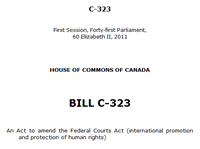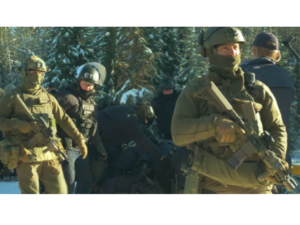Congolese massacre victims denied justice in Anvil Mining lawsuit
 Two years ago, a group of Congolese citizens launched a class action lawsuit in a Quebec court against Anvil Mining Ltd., alleging that the company was complicit in widespread atrocities committed during an October 2004 raid by the Congolese military in the town of Kilwa, Democratic Republic of Congo. The company allegedly provided logistical support for the military raid in the form of vehicles and airplane transportation. The United Nations concluded that over 70 people were killed in the incident.
Two years ago, a group of Congolese citizens launched a class action lawsuit in a Quebec court against Anvil Mining Ltd., alleging that the company was complicit in widespread atrocities committed during an October 2004 raid by the Congolese military in the town of Kilwa, Democratic Republic of Congo. The company allegedly provided logistical support for the military raid in the form of vehicles and airplane transportation. The United Nations concluded that over 70 people were killed in the incident.
On November 1, 2012, the Supreme Court of Canada turned down the plaintiffs’ request to appeal a lower court ruling that had halted the case on jurisdictional grounds. Bringing these jurisdictional questions to the Supreme Court was the last hope to have the class action lawsuit certified and able to be heard on the merits of the case. The Supreme Court’s decision not to hear the case not only brings this litigation to an end but will likely have broader implications for other victims of human rights abuses committed by Canadian companies and their chances of bringing similar cases to our courts.
The Anvil lawsuit was an important test for the Canadian justice system. At first, it broke new ground in Canada when, in April 2011, a Superior Court judge ruled that Canada was in fact an appropriate jurisdiction to hear such a case. Previous attempts to hold Canadian corporations accountable in Canada had been tossed out on grounds that the cases should be heard in the country where the acts were committed. Yet, very often these countries have weak judicial systems or lack the political will to address such cases. As Judge Benoît Emery stated his decision in April 2011: “In fact, at this stage of the proceedings, everything indicates that if the Tribunal dismissed the action […], there would exist no other possibility for the victims to be heard by civil justice.” However, the Superior Court judgment was overturned upon appeal in January 2012. The Court of Appeal ruled that Anvil’s Montreal office was not directly involved in decisions leading to its alleged role in the massacre, and therefore the Quebec court lacked jurisdiction.
On a more positive note, efforts are already underway to provide greater access to Canadian courts for victims of human rights abuses committed internationally. Bill C-323, a private member’s bill tabled in the House of Commons in October 2011, would grant foreign plaintiffs standing in the Federal Court of Canada to seek redress for international human rights violations. Bill C-323, An Act to Amend the Federal Courts Act (International Protection and Promotion of Human Rights), is inspired in part by the Alien Tort Claims Act, a similar piece of legislation in the United States that has been used several times to launch civil lawsuits against U.S. companies regarding harms committed outside the United States.
For more information on Bill C-323, visit the Parliament of Canada website.
For more information on the Anvil class action lawsuit and the 2004 massacre at Kilwa, visit the Canadian Centre for International Justice website (disponible en français).
Related article on KAIROS website:
For more information, please contact Ian Thomson, Program coordinator for ecological justice through corporate accountability, 613-235-9956 ext. 222 or ithomson@kairoscanada.org.











